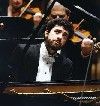Konstantin Lifschitz at the Monadnock Music Festival
By: Michael Miller - Aug 11, 2006
Monadnock Music Festival, Saturday, July 29, Peterborough Town House, 5 pmKonstantin Lifschitz, piano, Shostakovich: Preludes and Fugues from Op. 87, Mozart: Piano Quartet in g minor, K. 478, Joel Pitchon, violin. Tawnya Popoff, viola, and Rafael Popper-Keizer, cello.
The Monadnock Music Festival Orchestra, James Bolle, conductor , Konstantin Lifschitz, pianoHaydn: Symphony No. 87 in A, Mozart: Piano Concerto #18 in B flat, K. 456, Schubert: Symphony No. 5 in B flat
The Monadnock Festival, founded by the composer/conductor James Bolle, celebrates its fortieth anniversary this year. Every summer, primarily in the Peterborough Town House, it presents a lively series of solo, chamber and vocal recitals, along with the chamber orchestra developed by Mr. Bolle. Its mission is to present a wide repertory in 'first-rate performances" in "an atmosphere...conducive to a close audience-performer relationship...avoiding the star-system and...commercial packaging," something perhaps excessively familiar in our own region.
On Saturday, July 29 the thirty-year-old Ukrainian pianist, Konstantin Lifschitz, began the evening with a pre-concert devoted to four Preludes and Fugues by Shostakovich and Mozart's g minor Piano Quartet, K. 478, in which he was joined by members of the Ciompi Quartet. Mr. Lifschitz has been established in the U.S. since his debut with the Chicago Symphony Orchestra in 1999 and has been a regular and participant in the Monadnock Festival since 2003. He had his New York recital debut in 2002.
In his selection of Shostakovich Mr. Lifschitz paired somber minor preludes and fugues with monumental ones in major keys. He approached the quieter passages with an austere tone and a singing line, while in the louder passages he was produced truly massive textures. In the last of the set, no. 19 in E flat Major, his treatment of the prelude had a baroque grandeur which led into a fugue of symphonic scope.
In Mozart's Piano Quartet, with its ever-shifting moods, Mr. Lifschitz showed sensitive and singing phrasing, which moved with thrusting energy towards strongly accented and crisply articulated cadences, followed by emphatic rests. He is keenly aware of the importance of silence in music. His fine articulation of passage-work balanced by the ability to muster real weight in his climaxes made this a robust interpretation in which the delicacy of the music was rarely compromised. The Ciompi Quartet provided a solid accompaniment without quite matching Mr. Lifschitz' strong and constantly interesting personality.
In the main concert at 8pm, Mr. Lifschitz was joined by Mr. Bolle and the Monadnock Music Festival Orchestra, who began the concert with a nicely balanced performance of Schubert's 5th Symphony, enlivened by playing that was both enthusiastic and neatly phrased, and an incisive Haydn Symphony No. 87 in A, which particularly appealed to Mr. Bolle's composer's ear and intellect. He included most if not all repeats, giving Haydn's sophisticated invention plenty of room to unfold. He took special pleasure in the rich chords and varied textures of the slow movement, giving full point to every detail without impairing the flow of the music. Haydn demands clarity, but Mr. Bolle and his musicians never compromised their informal unanimity with forced precision.
The concert closed with Mozart's Piano Concerto in B flat, K. 456, which is one of the least often played. Mozart wrote it not for one of his own performances as a keyboard virtuoso, but for an amateur pupil of his, and it lacks some of the fluency and multi-dimensionality of the others. However, it is not without its own charm and surprises, and I am always happy to see it on a program. The close affinity of conductor and soloist was apparent everywhere in the responsive give-and-take of all concerned, especially the woodwinds always so present in Mozart's scoring, whether in opera or in a concerto like this one. Both conductor and pianist showed particular sensitivity to Mozart's pauses and the silences within the weave of the music. This sympathetic pair seemed willing to follow one another wherever Mozart's intimate singing lines and energetic tutti might take them.
I always look forward to Mr. Bolle's intelligence and solid musicianship, and Mr. Lifschitz was no disappointment. I'll look forward to many more evenings of his unique blend of sensitivity and drive.

